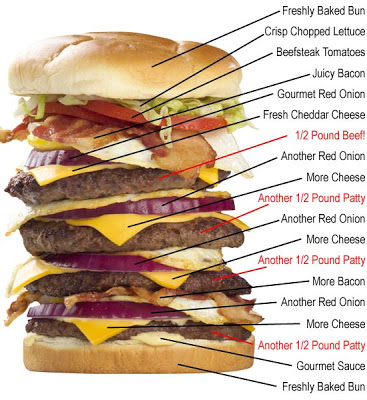NEW ON DRSUE.CA! Prefer to listen? Check out my audio recording of this post here:
As blogged last week (part 1), this excellent Clinical Practice Statement by the US Obesity Medicine Association (OMA) works to dispel not 1, not 2, but THIRTY myths, misunderstandings, or oversimplifications about obesity.
This entire article is a great read (and a free download). While I agree with much of the mythbusting outright, I have chosen six myths which I felt deserved a little more commentary, highlighting, disagreement, or explanation. Those that I agree are myths (ie statement is indeed false) I have colored in red; if it could go either way (ie statement could be true or false), I have left it in black. I am splitting this into two blogs. Here is part 2!
Myth #25. Every pound of muscle that replaces fat burns an additional 50 calories per day.
It is true that resting muscle burns more calories in a day than fat tissue. As per Table 9 in the paper, one lb of resting muscle burns 6 calories per day at rest, whereas one lb of fat burs 2 calories per day. In other words, a pound (or kg) of muscle burns three times more calories in a day than a pound (or kg) of fat. However, if one pound of muscle replaces one pound of fat, the difference is only 4 calories per day.
(If you are used to kg: 1kg of resting muscle burns 13 calories in a day, 1kg of fat burn 4.5 calories in a day. If a kg of muscle replaces a kg of fat, the difference is 8.5 calories per day).
So, while it is definitely good to have more muscle mass and less fat mass for many reasons (as a reflection of physical activity which is good for us metabolically, physically and mentally; for bone protection, fall prevention, and many other benefits), the difference in numbers of calories burned at rest is not that big.
The other point the authors make is that fat does not simply ‘turn into’ muscle when we exercise, nor does muscle simply ‘turn into’ fat when we don’t. But what is true is that when we are active, we build muscle mass, which is healthy tissue to have on board.
Myth #27. Setting more realistic obesity goals will ultimately achieve greater weight reduction than more aggressive goals.
The authors make the argument that setting more modest goals may undermine optimism and motivation for engaging in behaviors required for clinically meaningful weight reduction, and they note some reports suggesting that benefits of higher motivation via higher goals may outweigh the concern that high goals may undermine effort. They comment that seemingly ‘unrealistic’ targets may actually improve weight reduction results.
It is really important not to set oneself (or one’s patients) up for a feeling of failure by setting high expectations for lifestyle induced changes. While a small minority of people can achieve big weight loss success with lifestyle changes, it is very hard for most, and even for those who do, the vast majority regain the weight. Further to that, what motivates each individual is different. Fortunately, we now have excellent new and emerging medications that can help to achieve and maintain bigger weight losses, approaching the neighborhood of weight loss we see with bariatric surgery.
Myth #28. Slow and gradual weight reduction is ultimately more effective than large and rapid weight reduction.
The authors comment on clinical trial evidence supporting that the greater and more rapid the initial weight reduction, the greater the success of long term weight maintenance.
They also point out that those who lose more weight in the early months of a treatment (eg medication), the better their response will be. While this is true, these studies also show that a significant proportion of people who don’t have a lot of weight loss in the initial months, can still show a good success at 1 year. For some people, it just takes time.
My other comment here, is that clinical trial evidence does not necessarily reflect real life, because people in clinical trials get oodles of personalized support and care that usually doesn’t exist in the real world. A more intensive/calorie reduced program in a highly supported clinical trial will result in faster weight loss, true. And if that support is continued, I agree that there will be better long term maintenance. However, a more dramatic calorie reduced nutrition program is more difficult to sustain over the long term, especially if the support isn’t in place to stick to them. In accordance, studies also consistently show that when weight management medication or support is stopped at the end of a trial, weight goes back up.
So again here, it comes back to each individual’s journey. For some, larger and faster initial weight reduction may be the path to success. For others, slow and steady wins the race!
Share this blog post using your favorite social media link below!
Follow me on twitter! @drsuepedersen
www.drsue.ca © 2023












